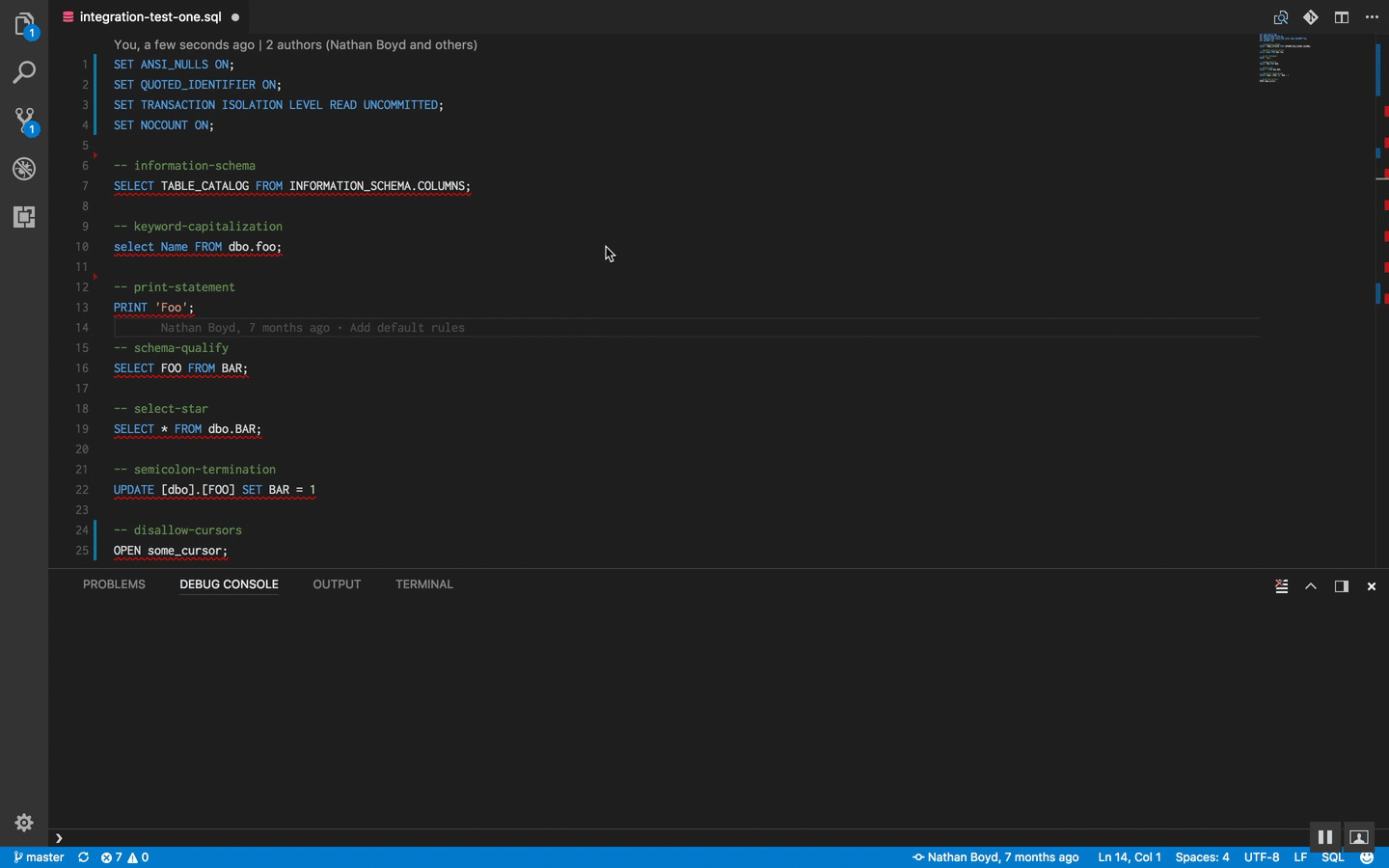TSQLLint is a tool for describing, identifying, and reporting the presence of anti-patterns in TSQL scripts.
TSQLLint currently officially supports installation with dotnet-tool, Homebrew, and NPM.
$ dotnet tool install --global TSQLLint
For OSX and Linux the recommended method of installing TSQLLint is to install the tool using homebrew.
$ brew tap tsqllint/homebrew-tsqllint
$ brew install tsqllintTSQLLint may also be installed with NPM
This binary can be installed though the npm registry. First, install Node.js version 4 or higher, and then install using the npm install command:
npm install tsqllint -g# lint a single file
tsqllint test.sql
# lint all files in a directory
tsqllint c:\database_scripts
# lint a list of files and directories, paths with whitespace must be enclosed in quotes
tsqllint file_one.sql file_two.sql "c:\database scripts"
# lint using wild cards
tsqllint c:\database_scripts\sp_*.sql
# print path to .tsqllintrc config file
tsqllint --print-config
# display usage info
tsqllint --help
# list the plugins loaded
tsqllint --list-pluginsIn addition to the CLI tool, TSQLLint is built into a Visual Studio Code Extension. This extension can be installed from within the VS Code Extension Interface or from the VS Code Extension marketplace.
TSQLLint uses a common message format that allows for integration into off the shelf tools. SQL Server Management Studio can use TSQLLint using SSMS's External Tools feature.
TSQLLint utilizes a configuration file called .tsqllintrc. This file can be generated and edited by users to create their own configurations. To generate this file use the -i or --init flags. If no .tsqllintrc is found the tool will use a default configuration loaded in memory.
# generate a default .tsqllintrc file using the init flag (optional if just using a default configuration)
tsqllint --initTo configure TSQLLint edit its config file, which is named .tsqllintrc. To find its location run tsqllint with the --print-confg or -p option.
TSQLLint will load its config file in the following order or precedence:
- The value passed with the
-ccommand line argument, if one is passed - An Environment Variable named
TSQLLINTRC - A file named
.tsqllintrcin the same local directory in which TSQLLint is executing - A file named
.tsqllintrcin the user's home directory
TSQLLint rules may be set to "off", "warning", or "error". Rules that are violated and are set to "error" will result in TSQLLint returning a non-zero exit code. Rules that are violated, but configured to "warning" will result in a zero exit code, but a warning message will be displayed in the shell output. Rules that are set to "off" will be completely ignored. Rules that are not present in the .tsqllintrc configuration are set to "off"
{
"rules": {
"case-sensitive-variables": "error",
"conditional-begin-end": "error",
"count-star": "error",
"cross-database-transaction": "error",
"data-compression": "error",
"data-type-length": "error",
"delete-where": "error",
"disallow-cursors": "error",
"full-text": "error",
"information-schema": "error",
"keyword-capitalization": "error",
"linked-server": "error",
"multi-table-alias": "error",
"named-constraint": "error",
"non-sargable": "error",
"object-property": "error",
"print-statement": "error",
"schema-qualify": "error",
"select-star": "error",
"semicolon-termination": "error",
"set-ansi": "error",
"set-nocount": "error",
"set-quoted-identifier": "error",
"set-transaction-isolation-level": "error",
"set-variable": "error",
"update-where": "error",
"upper-lower": "error",
"unicode-string": "error"
}
}To temporarily disable all rule warnings in a script, use comments in the following format:
/* tsqllint-disable */
SELECT * FROM FOO;
/* tsqllint-enable */To disable or enable warnings for specific rules:
/* tsqllint-disable select-star */
SELECT * FROM FOO;
/* tsqllint-enable select-star */To disable warnings for the entire script, place a /_ tsqllint-disable _/ comment at the top of the file:
/* tsqllint-disable */
SELECT * FROM FOO;To disable specific rule warnings for the entire script place a comment similar to the following at the top of the file:
/* tsqllint-disable select-star */
SELECT * FROM FOO;TSQLLint provides a configurable "compatibility-level" that aligns with SQL Server's Compatibility Level. The value defaults to 120 but may be changed with the following edit to the .tsqllintrc or by using inline comments within the SQL file. TSQLLint supports the following compatibility levels 80, 90, 100, 110, 120, 130, 140, and 150.
Setting the compatability level within the .tsqllintrc file configures the default Compatability Level for all files.
{
"rules": {
"upper-lower": "error"
},
"compatability-level": 90
}Setting the compatability level using inline comments configures the Compatability Level for just that file. Overrides should be placed at the top of files.
/* tsqllint-override compatability-level = 130 */
SELECT * FROM FOO;Many tools in the SQL ecosystem support placeholders to templatize SQL files as shown in the example below:
SELECT * FROM FOO WHERE BAR = '$(MyPlaceholderValue)';Before applying any linting rules, TSQLLint will replace any placeholder in a SQL file with values provided via environment variables.
You can extend the base functionality of TSQLLint by creating a custom plugin. TSQLLint plugins are Dotnet assemblies that implement the IPlugin interface from TSQLLint.Common. Ensure the plugin is targeting netcoreapp2.0.
After developing the plugin, update the .tsqllintrc file to point to its .dll.
{
"rules": {
"upper-lower": "error"
},
"plugins": {
"my-first-plugin": "c:/users/someone/my-plugins/my-first-plugin.dll",
"my-second-plugin": "c:/users/someone/my-plugins/my-second-plugin.dll/"
}
}This sample plugin notifies users that spaces should be used rather than tabs.
using System;
using TSQLLint.Common;
using System.IO;
namespace TSQLLint.Tests.UnitTests.PluginHandler
{
public class SamplePlugin : IPlugin
{
public void PerformAction(IPluginContext context, IReporter reporter)
{
string line;
var lineNumber = 0;
var reader = new IO.StreamReader(File.OpenRead(context.FilePath));
while ((line = reader.ReadLine()) != null)
{
lineNumber++;
var column = line.IndexOf("\t", StringComparison.Ordinal);
reporter.ReportViolation(new SampleRuleViolation(
context.FilePath,
"prefer-tabs",
"Should use spaces rather than tabs",
lineNumber,
column,
RuleViolationSeverity.Warning));
}
}
}
class SampleRuleViolation : IRuleViolation
{
public int Column { get; private set; }
public string FileName { get; private set; }
public int Line { get; private set; }
public string RuleName { get; private set; }
public RuleViolationSeverity Severity { get; private set; }
public string Text { get; private set; }
public SampleRuleViolation(string fileName, string ruleName, string text, int lineNumber, int column, RuleViolationSeverity ruleViolationSeverity)
{
FileName = fileName;
RuleName = ruleName;
Text = text;
Line = lineNumber;
Column = column;
Severity = ruleViolationSeverity;
}
}
}

